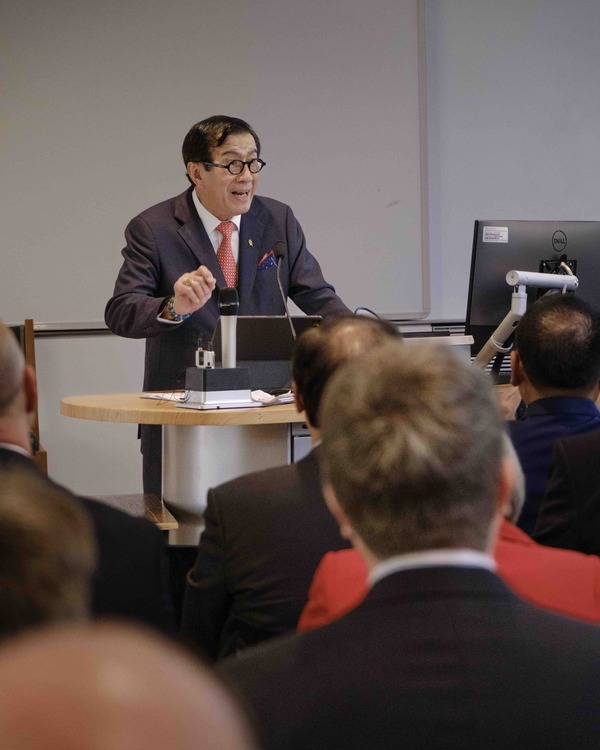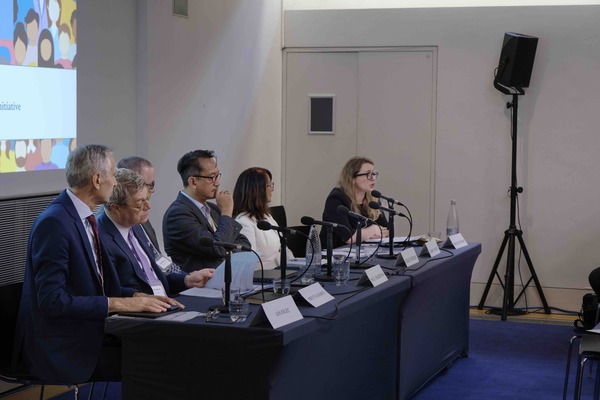From July 27 to 29, Notre Dame Law School’s Religious Liberty Initiative and Brigham Young University’s International Center for Law and Religion Studies hosted an enriching conference at the University of Oxford that gathered more than 150 participants. The conference attendees consisted of international law and human rights experts from around the world, including Australia, Indonesia, Ireland, Italy, Kenya, Nepal, Nigeria, Ukraine, the United Kingdom, and Uruguay.
The conference, titled “Civilizational Perspectives on Human Dignity for Everyone, Everywhere,” was organized in honor of United Nations Human Dignity Day. The discussants explored human dignity through various lenses, offering insights into human dignity as an extension of human rights, the state of religious freedom in Africa, the legal dimensions of human dignity, effective media engagement, the power of artistic expression in promoting awareness, the vital role of diplomats in protecting human dignity, and respect for religious minorities in the Islamic world, among several other topics.

Indonesian Law and Human Rights Minister Yasonna Hamonangan Laoly gave the keynote address and explained that human dignity issues can be examined through myriad perspectives due to cultural differences.
“Different perceptions about human dignity do not erase the fact that every individual shall be respected regardless of their background, race, gender, or social status,” he said.
Indonesia's participation in the conference is part of its ongoing effort to mobilize global support in establishing a Human Dignity Day through a UN resolution.
Laoly also spoke about some of the priorities of the Indonesian government in regard to ensuring the human rights of its citizens. He stated that the Indonesian government has prioritized the human rights protection of marginalized and vulnerable groups, including the elderly, children, women, and people with disabilities. Moreover, the Indonesian government has established a program that offers free legal support to underprivileged individuals as a form of expanding equal access to justice.
Ambassador Sarafa Tunji Isola, the Nigerian High Commissioner to the United Kingdom, also spoke at the conference. He reflected on the importance of UN Human Dignity Day, expressing that it should be observed globally as a way to elevate human rights and build cultures that respect human dignity worldwide.
“Collaborative partnerships, policy advocacy, and technology leveraging are key drivers for positive change and ensuring the principles of human dignity guide actions globally,” he said.

Some of the other panelists and attendees at the conference were Beatriz Argimón, vice president of Uruguay; Justice Daniel Musinga, president of Kenya’s Court of Appeal; Ambassador Chiara Porro, the Australian ambassador to the Holy See; Judge Ann Power, a serving judge of the Irish Court of Appeal; and Professor Nazila Ghanea, special rapporteur on freedom of religion or belief with the Office of the United Nations High Commissioner for Human Rights.
The conference offered a multifaceted program of panels and discussions that fostered new understandings, questions, and approaches to advancing human dignity. It also solidified the attendees’ commitment to promoting human dignity and reminded them of its intrinsic connection to human rights. Through open dialogue and collaboration, “Civilizational Perspectives on Human Dignity for Everyone, Everywhere” empowered the conference attendees to take action in creating a legacy of social justice within their respective communities and across broader societies.
About the Notre Dame Law School Religious Liberty Initiative
Established in 2020, the Notre Dame Law School Religious Liberty Initiative promotes and defends religious freedom for all people through advocacy, formation, and thought leadership. The initiative protects the freedom of individuals to hold religious beliefs as well as their right to exercise and express those beliefs and to live according to them.
The Religious Liberty Initiative has represented individuals and organizations from an array of faith traditions to defend the right to religious worship, to preserve sacred lands from destruction, to promote the freedom to select religious ministers, and to prevent discrimination against religious schools and families.
Learn more about the Religious Liberty Initiative at religiousliberty.nd.edu.
Originally published by at religiousliberty.nd.edu on August 03, 2023.